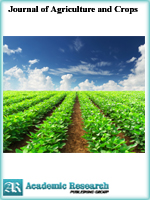Journal of Agriculture and Crops
Online ISSN: 2412-6381
Print ISSN: 2413-886X
Print ISSN: 2413-886X
Quarterly Published (4 Issues Per Year)

Archives
Volume 3 Number 2 February 2017
Potential Role of Aqueous Extract of Some Weeds against Egg Hatching and Juvenile Mortality of Root-Knot Nematode Meloidogyne incognita
Authors: Mohd Asif ; Moh Tariq ; Amir Khan ; Bushra Rehman ; Kavita Parihar ; Mansoor A. Siddiqui
Pages: 17-24
Abstract
Natural pesticides derived from plants are one of the best alternative approaches for the management of nematodes, as excessive use of chemicals eradicate beneficial organisms in the soil and disturb ecological equilibrium and ultimately cause environmental degradation. Six different weed plants viz., Achyranthes aspera L., Solanum xanthocarpum Schard. & JC wendl. Amaranthus spinosus L., Ranunculus pensylvanicus L.f., Cassia tora L., Oxalis stricta L. were collected from in and around the campus of the Aligarh Muslim University, Aligarh. The nematode eggs and juveniles were exposed at 24, 48 and 72 h in different concentrations (S, S /2, S /10, S /100, S is the standard concentration and S/2, S/10, S/100 is the dilution of Standard solution) of weeds extracts. The plant extract of weeds S. xanthocarpum and A. aspera exhibited highly promising mortality (86-100%) after 72 h exposure period respectively, while the plant extract of O. stricta and C. tora exhibited minimum promising mortality (48-52%) after 24 h of exposure period respectively. There was a gradual decrease in egg hatching with an increase in the concentration of aqueous extracts of weeds. A. aspera, S. xanthocarpum and A. spinosus were found to be most effective in reducing egghatching and increase in mortality of second stage juveniles of M. incognita. Efficacy of treatments improved with increase in their concentration and exposure period. Hatching of larvae and juvenile mortality were strongly influenced by concentration of plants extract.



